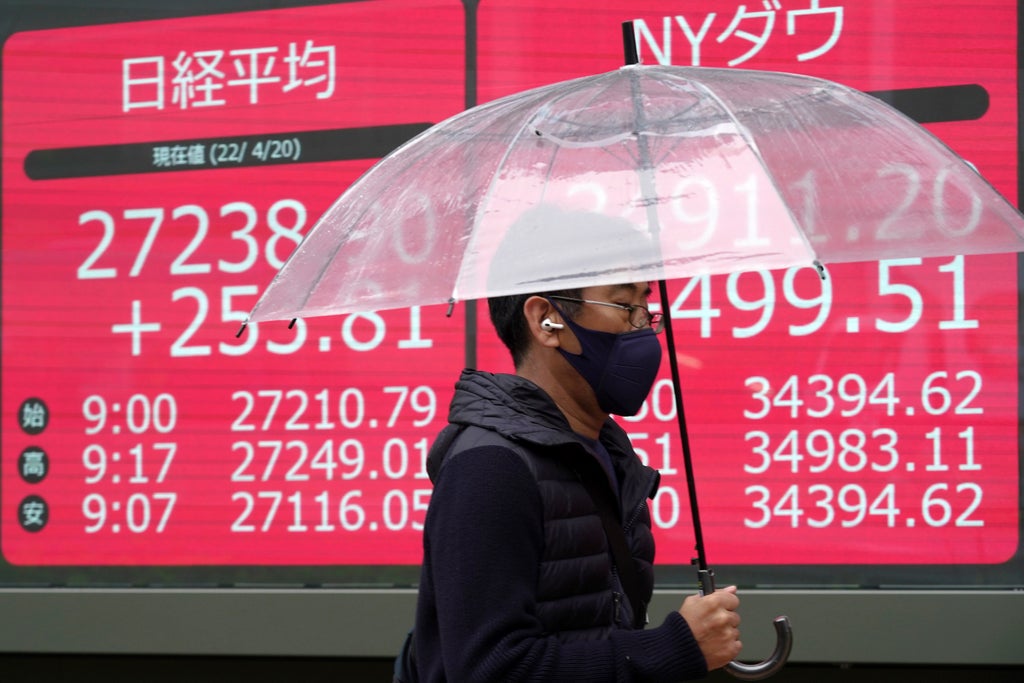
Stocks were mixed in Asia on Wednesday after a rally on Wall Street led by technology stocks.
Share benchmarks rose in Tokyo, Hong Kong and Sydney but fell in Shanghai. U.S. futures were lower and oil prices pushed higher.
Japan reported its trade deficit p ersisted in March as imports surged 31% thanks to soaring oil prices and a weakening yen. The deficit of 412 billion yen ($3.2 billion) for March was lower than the previous month's 670 billion yen but was quadruple analysts' estimates and a reversal from a surplus of 615 billion yen in March 2021.
Data for the fiscal year that ended in March showed exports jumped almost 24% but were outpaced by imports, which climbed 33%. The fiscal year deficit of 5.4 trillion yen (nearly $42 billion) was the highest in seven years.
“Seemingly, the global supply chain disruptions due to the ongoing war and China lockdowns are weighing on regional trade activity," ING economists said in a research note.
The dollar remained at a 20-year high against the Japanese yen, at 128.59 to the dollar. The weaker yen reflects a divergence between rising interest rates in the U.S., where the Federal Reserve is seeking to tamp down inflation, and unchanged rates in Japan, where the central bank has kept its key rate at minus 0.1% for years.
The weaker yen helps make Japanese exports more competitive overseas and fattens profits when they are converted from dollars to yen, but it also raises costs both for consumers and businesses.
Tokyo's Nikkei 225 index gained 0.8% to 27,198.13 while the Kospi in South Korea edged less than 0.1% higher to 2,720.21. The Hang Seng index in Hong Kong advanced 0.1% to 21,059.52 and the Shanghai Composite index slipped 0.6% to 3,174.35.
In Sydney, the S&P/ASX 200 picked up 0.1% to 7,569.50. India's Sensex gained 0.8% while the SET in Bangkok rose 0.4%.
On Tuesday, stocks overcame a weak start to finish broadly higher, giving the major indexes on Wall Street their best day in nearly five weeks.
The S&P 500 rose 1.6% to 4,462.21 and the Dow Jones Industrial Average rose 1.5%, to 34,911.20. The tech-heavy Nasdaq shook off an early loss and added 2.2%, closing at 13,619.66.
The Russell 2000 of small-caps rose 2% to 2,030.77.
Nearly 90% of the stocks in the benchmark S&P 500 rose. Technology stocks helped power the broad gains. Pricey valuations for many of the bigger technology companies give them more sway in directing the broader market higher or lower. Microsoft rose 1.7%.
Treasury yields continued their climb, which allows banks to charge higher interest rates on loans. The yield on the 10-year Treasury note rose to 2.94% from 2.85% late Monday.
The last time the indexes mounted a bigger rally was March 16. Stocks have mostly struggled this year amid uncertainty over how the economy and Corporate America will be affected as the Federal Reserve moves to reverse low-interest rate policies that helped markets soar in recent years.
Investors are focusing on the current round of corporate report cards as more big companies release their earnings. Signature Bank jumped 8.1% after beating analysts' expectations.
Netflix sank 26% in after-hours trading after the video streaming giant reported its first loss in worldwide subscribers in its history. Netflix said it expects to lose another 2 million subscribers in April-June. As of Tuesday's close, Netflix had already lost half its value since hitting an all-time high last November.
Railroad giant CSX will report earnings on Wednesday, along with Tesla. American Airlines and Union Pacific will report their results on Thursday.
Also Wednesday, the National Association of Realtors releases its home sales report for March.
The latest round of earnings comes as investors try to gauge how companies and consumers are dealing with rising inflation that has made everything from food to clothing and gas more expensive.
The conflict in Ukraine has added to those price pressures. The International Monetary Fund on Tuesday downgraded the outlook for the world economy this year and next, blaming Russia’s war in Ukraine for disrupting global commerce, pushing up oil prices, threatening food supplies and increasing uncertainty already heightened by the coronavirus and its variants.
In other trading:
U.S. crude oil gained $1.19 to $103.24 per barrel in electronic trading on the New York Mercantile Exchange. It sank $5.56 on Tuesday to $102.05 per barrel.
Brent crude, the standard for pricing international oil, added $1.19 cents to $108.44 per barrel.
The euro rose to $1.0819 from $1.0789.







